
News
Villagers cry foul as global giant exploits Zim lithium
Published
4 months agoon
By
NewsHawks…Clean energy transition comes at a cost
MAX Mind Investments Zimbabwe (Pvt) Ltd, a subsidiary of Chinese global giant Shenzhen Chengxin Lithium Group Company Ltd, is being praised in Zimbabwe, where it is projected to generate US$2 billion in annual revenue.
OWEN GAGARE
The government considers it a vital cog in its ambitious plan to establish a US$12 billion mining sector economy by 2030.
It is one of several international companies making the most of lithium, the globally sought-after mineral used to drive the clean energy transition – a transition that incorporates solar panels and rechargeable batteries for mobile phones, laptops, digital cameras and electric vehicles.
Zimbabwe is Africa’s largest producer of lithium.
Staff at Energy Capital & Power, the continent’s leading investment platform for the energy sector, estimate that if the country’s full potential of lithium resources is unlocked, it would meet upwards of 20% of global demand.
Investors — particularly from China — have been scrambling for the resource, which is exported globally as lithium concentrate. Chinese companies, including Max Mind Investments which operates Sabi Star Mine in Buhera district in the eastern province of Manicaland, have invested more than US$1 billion in Zimbabwe over the past few years.
Max Mind Investments enjoys support from the highest levels of Zimbabwe’s government. President Emmerson Mnangagwa visited the mine twice, once in 2022 and again in 2023.
However, as is the case in many parts of Zimbabwe where lithium is being mined, Max Mind Investments made way for its latest mine by moving 40 families from their ancestral land to pave the way for the company’s operations, leaving a trail of bitterness over unfulfilled promises and ruined livelihoods. Most families relocated in August 2023.
The families believe that the political support enjoyed by the company has been used to trample their rights, rendering them economically disempowered, food insecure and extremely vulnerable.
President’s praises
At the ground-breaking ceremony of Max Mind’s US$130 million mine on 14 December 2022, Mnangagwa was bullish about how the investment would set Zimbabwe “on an irreversible path of economic growth and development”.
“The plant is set to see the company contributing over US$500 million in earnings annually towards the realisation of the US$12 billion sector economy by 2030. The single plant in Buhera, in two years’ time, will be earning about US$2 billion,” Mnangagwa said.
The president was back on 31 August 2023 to officially commission the mine. On his initial visit to the mine in 2022, Mnangagwa praised Max Mind for constructing “state-of-the-art homes” for the 40 families who had to be relocated to make way for mining operations.
Of these families, 22 were relocated to the town of Murambinda, 17 were relocated to places within their communal area and one family was relocated to Mberengwa, in the Midlands province.
“I am so happy that before the company has started making money here, they have already begun improving infrastructure in this area. They have upgraded the 30km earth road from the main road to this mine. They have built state-of-the-art homes for families relocated from the mining area. Some have solar boreholes at their homesteads,” Mnangagwa said.
However, an investigation by The NewsHawks — which included interviews and site visits — has established that the lives of affected villagers is far from rosy.
Relocated families don’t share the president’s praises; they feel abandoned and betrayed for several reasons.
They say they were coerced into relocation after being issued subtle threats by the Buhera district development coordinator (DDC), Freeman Mavhisa, and their traditional leader, Chief Nyashanu.
The NewsHawks established that the villagers signed compensation agreements and were given monetary compensation before being evicted. Max Mind registered the compensation agreement with Zimbabwe’s Administrative Court, as required by law.
The process was done in the absence of villagers on the strength of the compensation agreements they signed, which showed they were agreeable.
“They (the mining company) took advantage of our ignorance. We signed the agreements because we were told that if we refused, the government would forcibly move us and dump us at a place of their choice. The DA (the district administrator, DDC Mavhisa) told us we would be forcibly moved if we resist. We had no choice but to comply,” said Martha Tagarira in an interview at Murambinda Growth Point, where she now resides.
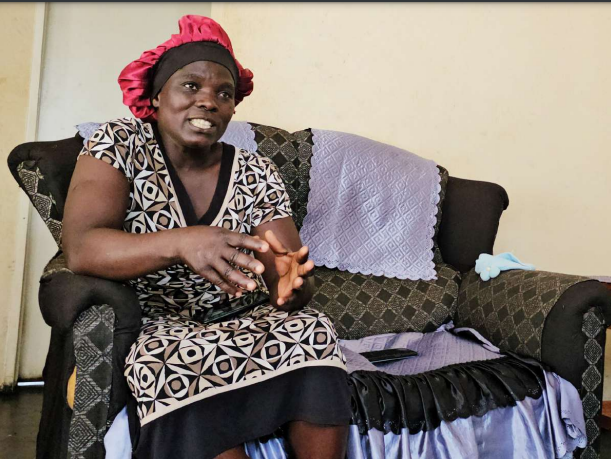
Coerced eviction
Lahliwe Musikavanhu (pictured), who was also resettled at Murambinda, said: “We were shown disrespect right from the beginning.
We saw people moving and drilling holes in our fields in 2021. They did not introduce themselves to us, but who knows, maybe they had engaged the chief and village head, but no one told us what was going on.
“Sometime in 2022, they told affected people that they will be moved but adequate compensation will be paid to affected families. They promised to compensate for all the infrastructure one had at their homes, including boreholes, kraals, pens, fowl runs and even fruit trees. In the case of houses, they said whatever one had built, they would construct at least three extra rooms, but this did not happen.”
She said formal engagements between the mine management, villagers, traditional leaders led by Chief Nyashanu and government officials started in February 2022. The government team, which included several departments, was led by Mavhisa.
“We did not have lawyers to represent our interests and we believed the DA (DDC), chief and village heads would represent us. But Mavhisa and Chief Nyashanu made it clear from the onset that the investment had government approval, so we had no choice but to move,” she said.
“I was one of the people who did not want to move. I tried to resist, but they said I would move ‘whether I like it or not’. In any case, they said my house would develop cracks because of the blasting at the mine.”
The affected families say whenever they raised questions directed at the mine management, which was represented by Alfas Mugova during negotiations, Chief Nyashanu would jump in to respond. Mugova was the company’s project manager at the time.
“We later learnt that the company had constructed a beautiful house for him at Murambinda, although he was not affected by the mining operations. Many of us saw this as payment for ensuring we move without adequate compensation,” said one of the affected villagers, who declined to be named, saying accusing a chief of corruption could compromise his family.
Several community members echoed this sentiment and told The NewsHawks that they believed the chief was bribed with a house.
The NewsHawks visited the house at Murambinda town. The NewsHawks tried contacting Chief Nyashanu for comment, but he had still not answered calls by the time of publication.
Responding to questions, Mavhisa said villagers insisted on being resettled in town against his and Chief Nyashanu’s advice.
He added that the company offered to buy a farm to resettle all affected persons and that it had pledged to build a school and clinic, as well as establish irrigation facilities for the families. “They turned down that offer.
As far as I know, government officials explained to them the implications of settling in town, but they refused to take our advice.
“It’s unfortunate that the money they were given has run out, so now they are pointing fingers at us.” Mavhisa said a multi-government team was always involved in all discussions.
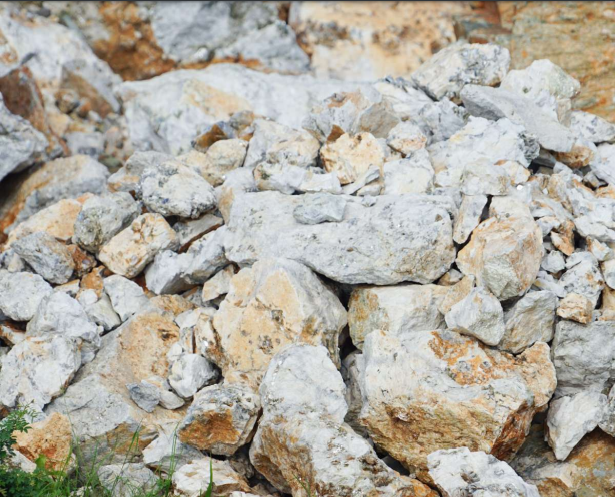
Shattered livelihoods
Musikavanhu explains how people’s livelihoods have been affected by the move off their subsistence farmland into town.
“We are now living in town and have to buy everything from vegetables to meat, but we don’t have the money. We are now suffering.
“We tried to get compensation for the land we had in the communal area, but the chief and DDC were clear that we would not be compensated. They told us that all land belongs to the government.
“Chief Nyashanu emphasised that he was the custodian of the land, while the DDC said the land belonged to the government. They told us we had no claim at all. Village head Tagarira tried to fight in our corner but was silenced by the chief.”
The evicted families now have small vegetable gardens in their backyards, but there is no space to grow maize and other crops that sustain them throughout the year.
Compensation agreement, unfulfilled promises and sub-standard infrastructure A copy of the compensation agreement, seen by The NewsHawks, reveals that the company would build five-room houses for the affected villagers on stands measuring 450 square metres.
The company also pledged to give them US$1 900 to help them settle. This agreement was registered at the Administrative Court after Mugova made an application stating that the company and villagers had come to an amicable agreement.
The court approved the evictions based on this statement of all parties being in agreement. However, the villagers are unhappy that they were not compensated for their goat pens, cattle kraals, wells and boreholes, as was verbally communicated to them.
Mugova’s founding affidavit, lodged at the Administrative Court, recognises that the re – spondents “have built homesteads and own other assets, including inter alia cattle kraals and related infrastructure within the boundaries of the properties which they occupy as villagers of Mukwasi Village”.
According to the compensation agreement, the miner committed to meeting the costs of compensation of properties occupied by the occupier.
The miner also pledged to “construct a new residential property for occupation by the occupier in Murambinda Township” at its own cost.
The miner pledged to meet all costs of relocation of the occupier from their former proper – ties to their current property.
“The Occupier accepts that once the new property has been developed by the Miner, and subject to the Miner meeting the relocation expenses referred to in paragraph 3 below, he shall not have any further claims against the Miner in respect of compensation,” the agreement reads.
The agreement goes on to state that “upon the Occupier taking up occupation of the new property from the Miner, the Occupier shall receive a token monetary settlement of US$1 900.”
Of that amount, US$1 000 was to be paid as a lump sum upon the occupier taking vacant possession of the property. The rest was to be paid in monthly instalments of US$150 each month. The monetary agreements were met.
The evicted families, however, say the compensation was paltry, given that many families lost their source of livelihood — their communal land — and are now living in poverty at Murambinda town.
“Now we need cash daily. We don’t have our vast fields and domestic animals, ensuring that we are food secure,” said Shame Mashokozi.
“When we started, things were better because we could use the money we received after relocation, but it has been exhausted and we don’t have jobs. This means we have been condemned to a life of poverty and destitution.”
The affected persons are also accusing the company of failing to honour various verbal agreements.
“We were completely misled and, unfortunately, we didn’t know the importance of having lawyers to represent us, so the company just ignored most of the things we had agreed on,” said Mashokozi.
“They failed to honour things that are written down (in the compensation agreement), so you can imagine the things we agreed to verbally. It is written that the company would build houses on 450m² stands, but in fact most of our stands are between 350m² and 360m². That extra space could have been used to grow vegetables or build a cottage, although small.”
Clause 1.2 of the compensation agreement mentions that the stand sizes would be 450m².
“The property to be developed by the Min – er and used to compensate the Occupier shall be on stand no . . . Murambinda, measuring 450 square metres and in the form of the designs attached hereto as Annexure B, subject to any modification, or amendments that may be made to the said design by the local authority for approval of construction of the property,” reads a compensation agreement given to each of the persons resettled at Murambinda.
There is a bigger problem. Some of the hous – es have developed cracks and the villagers say this is evidence that they are sub-standard. Colleta Chitengu said the company repaired cracks soon after they moved in, but these are appearing again.
“This shows that the houses are sub-standard,” she said.
“We fear the cracks will keep widening, meaning the houses will eventually collapse. “Besides, we were not given title deeds, so we fear that some years down the line they could be taken away from us. Without title deeds, we don’t have proof that we own these houses. This is an urban area, so we need title deeds — unlike in the village where we were.” Other promises were also not honoured, ac – cording to the villagers.
“The company promised to employ at least one person from each of the affected persons and pay our electricity bills for three years, but they failed to honour their word. The people we were negotiating with such as Mugova are no longer there, so now the company just asks us to provide proof,” said Mashokozi.
“But we have nothing in terms of evidence. That’s why we are struggling to give you accurate dates of events.”
Those resettled at Murambinda have piped water from a solar-powered borehole. However, they face acute water shortages during winter. They resort to a single manual borehole drilled for the entire community.
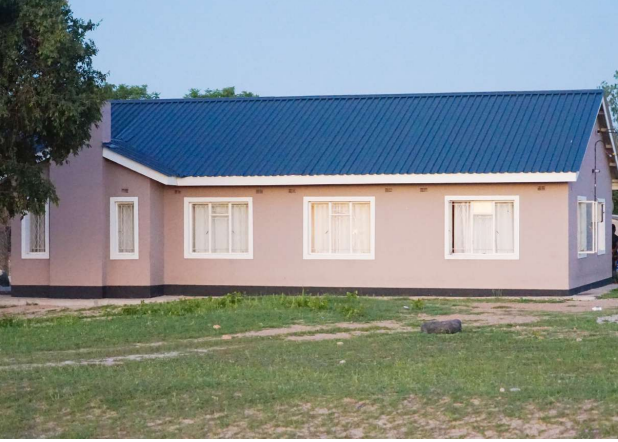
Unfulfilled borehole pledges
Those settled within Mukwasi village said they were promised a borehole per family, but the company drilled only a communal borehole.
The borehole was drilled in the middle of one of the villages and is inaccessible to domestic animals during the farming season. It gets worse.
The borehole water is contaminated and unsafe for human consumption, as revealed by tests carried out by The NewsHawks.
A community member, Plaxedes Zinatsa, said the water from the borehole turns red after some time. She said families using the borehole were constantly suffering from running stomachs after consuming the water.
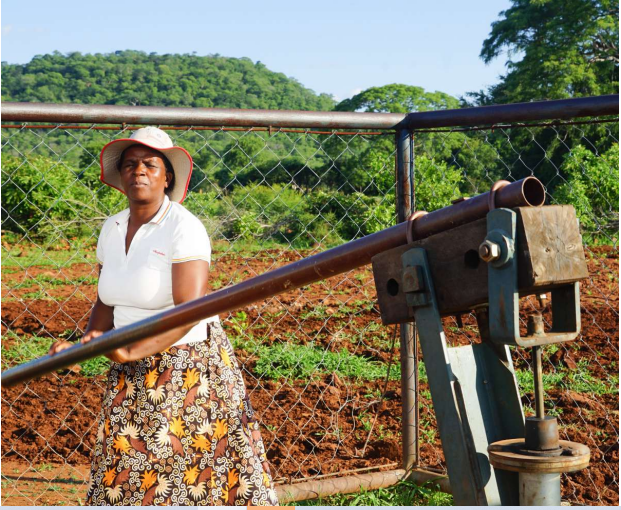
“Even we, who were settled in the village, are unhappy like our counterparts in Murambinda. We have complained several times about the water. The company came and took water samples for testing, but they did not tell us the results. We are always sick and fear dying of water-borne diseases. I lost four sheep after they drank water from the borehole,” said Zinatsa.
The NewsHawks took water samples from the borehole and tested them at a leading Harare laboratory, Zim Labs. The water was deemed unsafe.
“The water may be considered unsafe for human consumption since the parameters for the TVC (total viable count), turbidity and coliform, are above the recommended limits,” reads the test certificate.
Total viable count is a test that estimates the total number of micro-organisms, such as bacteria, yeast or mould species, that present in a water sample.
The result of a TVC test indicates the general level of contamination within a system and the overall quality of the water.
A World Health Organisation technical brief, titled Water Quality and Health — Review of Turbidity, says: “The sources of turbidity [i.e. the cloudiness of water] are diverse, and many of the constituent particles (e.g. clays, soils and natural organic matter) are harmless. However, turbidity can also indicate the presence of hazardous chemical and microbial contaminants, and have significant implications for water quality.”
Total coliform bacteria are found in the soil and vegetation throughout the environment and are generally thought to be harmless, but they are also seen as the primary indicator bacteria for the presence of disease-causing organisms.
Zinatsa said the problems of those settled within the Mukwasi village have been compounded by the small fields they now have and the knowledge that the company is making money as they wallow in poverty.

Hunger and dust take their toll
Siboniso Komboni, also from Mukwasi village, said: “Our lives have been turned upside down. As you can see, heavy trucks are constantly moving to and from the mine, raising dust. We are inhaling dust daily and we fear that we will be having chest problems soon.
“The most painful part is that the company is unwilling to engage us. We have tried to seek an audience with them several times. We were negotiating with Mugova, but they moved him to another mine. We think this was deliberate. The mine owners do not want to engage us.”
The NewsHawks observed the company was sprinkling water at busy spots such as schools and shops along the 30km stretch to the main road, in an effort to contain dust.
It was, however, not covering the entire earth road, resulting in dust being raised by heavy vehicles travelling to and from the mine.
Social ills
Komboni also said the company had brought social ills to the community while contributing to the breakdown of families.
She said the community was used to a slow and peaceful life until the company started operating.
“Before the company came, we never knew of prostitution. But because men are employed here and spend months without going home, we now have ladies coming from all over the country to offer sexual services at a price,” she said.
“Young boys and men from the area are seeing a different type of life and some are experimenting with them. Young girls from the community are also being tempted. There has been a culture shock. “This would not have happened if they were offering our children jobs,” she said.
“I don’t understand why the company can’t employ locals if they are qualified.”
Government responds
Gabriel Masvora, director of communications and advocacy in the Ministry of Local Government, Public Works and National Housing, said Zimbabwean law stipulates that one is compensated only for improvements on land when moved from communal land, hence the non-compensation for the loss of farming fields.
He confirmed that the ministry received complaints over cracks and the dust emission, but said the company was committed to addressing these concerns.
He said Max Mind was planning to tar the road but had committed to pour water on the road surface as a temporary measure to contain the dust.
Masvora said the ministry was unaware that Chief Nyashanu had received a house from the mine. He denied that the villagers were coerced into moving by Mavhisa and Chief Nyashanu, arguing that a multi-stakeholder team was involved in determining how they would be moved.
He said the company offered to buy a farm for the villagers so that they would be resettled as a village, but they rejected the offer.
Relocation above board – mining company
Max Minds spokesperson Emmerson Njanjamangezi told The NewsHawks that the relocation exercise was done in a transparent manner and evicted families were fully aware of the implications.
“The families were properly engaged even from the start of exploration so that they were aware of what was taking place in their area. Meetings with the district administrator, traditional leadership and other government departments were held in Shona to brief them on the mine’s intentions,” Njanjamangezi said.
“The relocation is not something that happened overnight, it took almost a year. The agreement was read through and explained in Shona by the then MP, William Mutomba, and corrections were done until we had a fine document that everyone agreed on.”
Njanjamangezi said the families independently chose where to stay and turned down the company’s offer to purchase a farm for them. He said those who chose to settle in Murambinda had to abide by council by-laws, which bar the rearing of cattle in the township.
He said some of the relocated families in the township have gardens for vegetables and green mealies.
“It is also important to note that when relocation started, the mine proposed to buy a farm with irrigation facilities for the relocated families. However, they declined that offer, insisting that they wanted township life,” Njanjamangezi said.
“More importantly, some families who opted to have their houses relocated to Murambinda bought other rural homes closer to the township to relocate their domestic animals.” Regarding compensation for land, Njanjamangezi said it was unfortunate that the mine does not own fields, adding that communal land is not sold as it belongs to the state. He confirmed that the company had received “reports of cracks [by] relocated families”.
“The issues were attended to and sorted out,” Njanjamangezi said. He said the ownership of the houses was transferred to individual owners last year. “Murambinda Rural District Council is processing the title deeds for the 22 relocated families. All the council fees for that have been paid by the mine already,” he said.
The mine said it was aware that dust was a problem due to the increased traffic to and from the mine.
“For now, in consultation with the community, the mine is watering down the road as a temporary dust suppression method. However, there are plans to construct a tarred road when funds permit,” Njanjamangezi said.
He said all the boreholes that were drilled for the community were monitored for more than a year, and results had shown that the water was safe for human consumption. Max Mind insisted that the mine offered most relocated families employment opportnities.
“Some turned the offers down and some took up the offer,” Njanjamangezi said.
The company denied that it was giving affected persons the cold shoulder since reassigning Mugova.
Njanjamangezi said new officers had continued with regular community interface meetings, which also involve community representatives and traditional leaders.
‘Why we built a house for Chief Nyashanu’
The company admitted building a house for Chief Nyashanu but said it was not a bribe. “Sabi Star Mine built a house for Chief Nyashanu in Murambinda.
This was part of the traditional rites for Chief Nyashanu in line with the traditional customs of the Buhera community.
That is what we were advised during a meeting,” Njanjamangezi said.
“As Sabi Star Mine, it is part of our sustainable business model to blend in the local culture and honour local beliefs and traditions of the community in which we do business.”
Max Mind scoops empowerment award
In 2023, Max Mind Investment was awarded the Zimbabwe Excellence Award for Community Empowerment and Social Leadership at the seventh Zimbabwe ESG (Environmental, Social and Governance) Report Awards ceremony, held in Harare on 24 November.
The company is credited for the following: upgrading a 31km earth road from Gaza to Mukubu; building houses for relocated villagers and compensating them; employing workers from nearby communities.
You may like
-
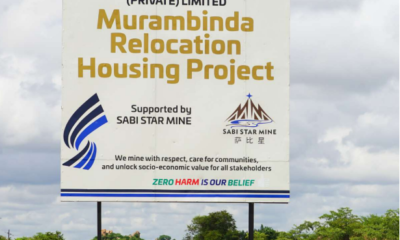

On the ground: Displaced villagers livelihoods have deteriorated
-


Presidential spokesperson attempts to trash resettled villagers’ suffering
-
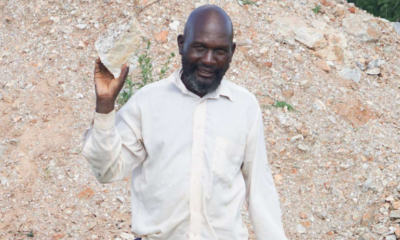

‘I refused to be bullied, no regrets’
-
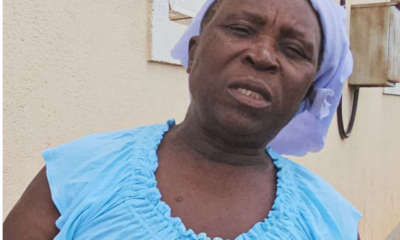

There’s no rest for the dead
-
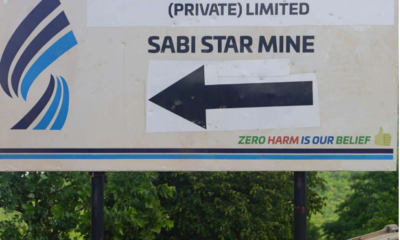

Max Mind taking advantage of villagers’ ignorance of law
-
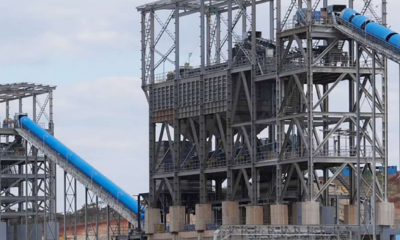

Bad conduct blights China’s US$700m lithium investment








